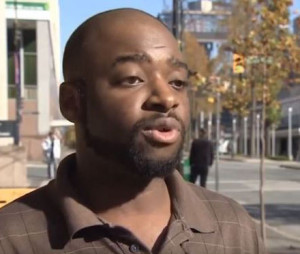US citizen seeks refugee status in Canada
A black American has applied to Canada’s Immigration and Refugee Board in Vancouver to grant him refugee status.
Kyle L Canty told Canadian immigration officials that after living in seven different states, he has faced what he describes as harassment and undue targeting by police in each one of them because he is a black man.
The native New Yorker says the recent spate of high-profile cases involving alleged police misconduct of black male citizens has only increased fears that this pattern might ultimately cost him his life.
Under Canadian law, people seeking permanent refuge in the country must provide evidence that they face grave danger in their homeland.
This can include evidence of a “well-founded fear of persecution on the basis of race, religion, nationality, political opinion or affiliation or membership in a particular group”.
Canada has long been an active participant in coordinated global efforts to welcome and resettle refugees.
Canada’s refugee resettlement program is significantly smaller than that of the United States and always has been. All told, Canada’s 2014 intake amounted to less than 17,000 people.
Mr Canty presented a case that one member of the refugee review board described as “well-prepared”.
As part of evidence submitted to the board, Mr Canty edited together multiple point-of-view videos of his interaction with police, including one where he was arrested for trespass in Salem, Oregon, when he spent two hours talking on the phone and using free Wi-Fi at a bus station.
“I got bothered because I’m black,” Mr Canty told the board. “This is a history of false arrest. My name is ruined because of the false arrest,” he said.
If Canada denies Mr Canty’s bid for refugee status, he will have to return to the US and face multiple outstanding charges for crimes such as jaywalking, disorderly conduct and issuing threats.
While Mr Canty has been accused of attempting to avoid American justice, and the string of mostly low-level charges he faces, other observers say he is a victim of policing policies that include undue stops, searches and a sense of harassment, tense and sometimes dangerous interactions, growing distrust, citations and arrests.
These policies in turn can lead to plea bargains and convictions for those unable to afford a lawyer.
Once a person has a criminal record in the US, it can make it difficult to get a job or, depending on the charges, impossible to receive federal student loans.
Activists say that policing in the United States helps to maintain and feed all sorts of inequality.
Mr Canty told the board that he has lived in a homeless shelter since arriving in Canada but would hope to work as a photographer in Canada and open a martial arts training centre if allowed to remain in the country.
The Washington Post has compiled a data base identifying 821 fatal police shootings in 2015 alone.
A disproportionate share of those shot and killed by police have been black or Latino – 345 people, or 42 per cent of those who have died this year.
Blacks and Latinos comprise just 30 per cent of the US population.
UN observers say that the United States has yet to implement the vast majority of the nearly 240 recommendations global human rights officials suggested during the United States’ first-ever periodic review in 2010.
Skye Doyle
AMES Australia Staff Writer













